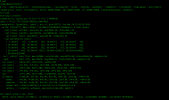Disk in question:
WD 3TB
https://hdd.userbenchmark.com/WD-Blue-3TB-2015/Rating/3522
Result:
$ fio --name=random-write --ioengine=posixaio --rw=randwrite --bs=4k --numjobs=1 --size=4g --iodepth=1 --runtime=60 --time_based --end_fsync=1
random-write: (g=0): rw=randwrite, bs=(R) 4096B-4096B, (W) 4096B-4096B, (T) 4096B-4096B, ioengine=posixaio, iodepth=1
fio-3.35
Starting 1 process
random-write: Laying out IO file (1 file / 4096MiB)
Jobs: 1 (f=1): [F(1)][100.0%][eta 00m:00s]
random-write: (groupid=0, jobs=1): err= 0: pid=36790: Sat Mar 23 13:44:02 2024
write: IOPS=4441, BW=17.3MiB/s (18.2MB/s)(2677MiB/154310msec); 0 zone resets
slat (nsec): min=777, max=3291.6k, avg=3339.05, stdev=5534.31
clat (nsec): min=326, max=26603k, avg=83280.84, stdev=826982.06
lat (usec): min=7, max=26605, avg=86.62, stdev=827.02
clat percentiles (usec):
| 1.00th=[ 17], 5.00th=[ 17], 10.00th=[ 18], 20.00th=[ 18],
| 30.00th=[ 18], 40.00th=[ 19], 50.00th=[ 19], 60.00th=[ 20],
| 70.00th=[ 21], 80.00th=[ 22], 90.00th=[ 33], 95.00th=[ 58],
| 99.00th=[ 143], 99.50th=[ 6718], 99.90th=[12911], 99.95th=[16450],
| 99.99th=[22676]
bw ( KiB/s): min=10864, max=179736, per=100.00%, avg=45897.41, stdev=56153.97, samples=119
iops : min= 2716, max=44934, avg=11474.35, stdev=14038.49, samples=119
lat (nsec) : 500=0.01%, 750=0.01%, 1000=0.01%
lat (usec) : 2=0.01%, 4=0.01%, 10=0.13%, 20=69.59%, 50=24.31%
lat (usec) : 100=4.04%, 250=1.27%, 500=0.04%, 750=0.01%, 1000=0.01%
lat (msec) : 2=0.01%, 4=0.01%, 10=0.41%, 20=0.16%, 50=0.03%
cpu : usr=1.41%, sys=1.92%, ctx=689495, majf=0, minf=16
IO depths : 1=100.0%, 2=0.0%, 4=0.0%, 8=0.0%, 16=0.0%, 32=0.0%, >=64=0.0%
submit : 0=0.0%, 4=100.0%, 8=0.0%, 16=0.0%, 32=0.0%, 64=0.0%, >=64=0.0%
complete : 0=0.0%, 4=100.0%, 8=0.0%, 16=0.0%, 32=0.0%, 64=0.0%, >=64=0.0%
issued rwts: total=0,685373,0,0 short=0,0,0,0 dropped=0,0,0,0
latency : target=0, window=0, percentile=100.00%, depth=1
Run status group 0 (all jobs):
WRITE: bw=17.3MiB/s (18.2MB/s), 17.3MiB/s-17.3MiB/s (18.2MB/s-18.2MB/s), io=2677MiB (2807MB), run=154310-154310msec
Disk stats (read/write):
dm-0: ios=2/247832, merge=0/0, ticks=86/2637960, in_queue=2638046, util=97.39%, aggrios=16/246355, aggrmerge=0/1512, aggrticks=698/2339625, aggrin_queue=2346692, aggrutil=97.48%
sda: ios=16/246355, merge=0/1512, ticks=698/2339625, in_queue=2346692, util=97.48%




